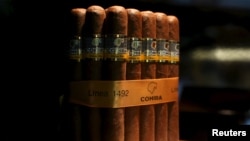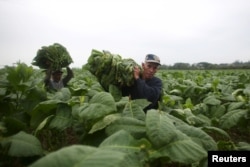Cuban cigar monopoly Habanos S.A. has compensated for a series of bad harvests by using genetically improved seeds and the renewal of weather-damaged land in Cuba's western tobacco-growing region, company officials said last week.
The weather phenomena El Niño led to Cuba's worst drought in a century in 2015, followed by heavy rain during the northern winter, which is normally a dry period in Cuba.
That has raised concerns among farmers and aficionados that the island's supply of its famous cigars might suffer at a time of increased demand resulting from detente with the United States.
Unusual weather has also affected competitors elsewhere in the Caribbean, said Leopoldo Cintra, commercial vice president of Habanos. The industry in Cuba has compensated with a "comprehensive plan" including genetically improved seeds that produce tobacco plants more resistant to drought and unseasonable rains.
Cintra also mentioned unspecified technology and the "recovery" of land. Farmers have reported replanting crops wiped out by rain.
Cigar experts say this year's annual harvest, which is coming to an end in March, will be the fourth substandard harvest in a row, a claim Habanos executives did not dispute.
"We think the impact will be minimal," said Javier Terres, vice president of development, who joined Cintra at a news conference to begin Cuba's annual cigar festival.
"What's more, we think ... there will be a positive recovery in our business," Terres said.
Habanos, a joint venture between the Cuban state and Imperial Brands PLC, does not report production figures.
It said revenues reached $428 million in 2015, a four percent increase versus 2014 when measured at a constant exchange rate.
The company says it has a global market share of 70 percent excluding the United States, where Cuban products remain illegal.
U.S. President Barack Obama and Cuban President Raul Castro announced in December 2014 they would seek to normalize relations after more than half a century of Cold War animosity.
Detente has led to international buzz about Cuba and a tourism boom. The number of visitors rose 17.4 percent to 3.52 million in 2015, with American visitors up 77 percent to 161,000.
That had a negligible impact on sales but was good for branding, Cintra said. The real impediment to sales is the U.S. embargo, which Obama wants to remove but Congress has left in place.
Terres said Habanos would be "thrilled" to compete in the United States but declined to speculate about the prospects.














